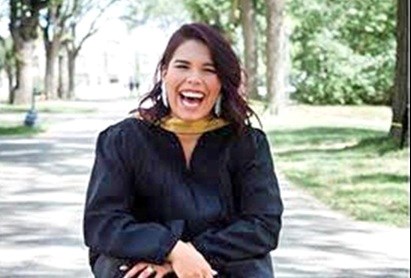After graduating from university, Kierra FineDay said it would be a “dream come true” to work with the people of Sweetgrass First Nation or surrounding area at some point in her career.
FineDay recently graduated with a Bachelor of Science in Pharmacy. FineDay is from Sweetgrass First Nation and spent most of her childhood there. FineDay attended Connaught School in North Battleford, along with school in Prince Albert.
FineDay spent six years in university, the first two being years to complete pre-requisites, while the remaining years went toward completing the Bachelor of Science in Pharmacy.
FineDay said she’s always been interested in science. Her mother, Karen, was an x-ray technician, a pharmacy technician and is now a nurse.
While in North Battleford, FineDay said she’d be given keys to the house as a youngster, and occasionally she’d forget her keys. FineDay would then have to go to the hospital to get keys from her mother.
“I remember learning about what my mom did and seeing the pharmacy and it was always something that stuck with me,” FineDay said.
“Then as I got older, my mom always said I should consider pharmacy because I was good at it and I could help a lot of people. So then I started to learn about what a pharmacist does.”
When FineDay was growing up, her mother would take her grandmother to medical appointments.
“We found that when my kokum would go alone she often wouldn’t understand what the doctor was telling her, and she’d be almost too uncomfortable to really ask what the doctor meant or to repeat things,” FineDay said.
“But thankfully my mom being a registered nurse [was] able to go along with her and kind of explain to my grandmother what the doctor was telling her about what the medications were for.”
FineDay said the experience got her thinking about how many elders on reserve would need someone to tell them why they’re taking medication.
“Growing up, when I would go to the reserve, you’d often hear elders and family members, and teenagers who were on prescription medication [who didn’t] understand why they were taking them. They would just decide they didn’t want to anymore without talking to anybody.”
FineDay said a pharmacist is one of the most accessible health professionals for people living on reserve, and when pharmacists work closely with communities, they can talk to people about medications or do things such as demonstrating how inhalers and epipens work.Â
“As a pharmacist, it isn’t all medications either,” FineDay said. “We can provide services to help prevent people from possibly needing them when they’re older,” such as smoking cessation and diabetes education.
Pharmacists can also act as health care navigators, as they often come into contact with other health care professionals.
Learning about Indigenous cultures, FineDay said, is important if students are later going to work on reserves as health care professionals.
“I feel like a lot of non-Indigenous people may not understand why they can’t just walk into a community and start helping,” FineDay said. “You have to know the people, you can’t just gather your information and leave. You have to become that community and get connected to it before people are really going to talk to you.”
FineDay said she was one of the few visibly Indigenous students in the college, there weren’t many services for Indigenous students and she felt the college “didn’t really reach out to the Aboriginal student centre or the other Aboriginal student achievement program” which helps first-year Indigenous students adjust to university life.
After an uncomfortable in-class incident, FineDay said she talked to Dr. Jason Perepelkin, whose research intersects with pharmacy and business, and Dr. Perepelkin helped her get in touch with a dean.
FineDay said they started “talking about ways we could integrate Indigenous knowledge into the curriculum and provide and reach out to Indigenous students to get them more involved in the college.
“It would be wonderful if we had more Indigenous pharmacists and dieticians in the college,” she said.
After talking to the College of Pharmacy, FineDay found out it started to create a program to reach out to Indigenous students in Saskatoon and in Saskatchewan. FineDay also helped create a student group, a goal of which is to “expose our students and help bridge that gap between Indigenous students and non-Indigenous students especially in the college as well as on campus.”
FineDay said she thinks courses such as Native Studies for medical professionals “who are going to be working with multiple different types of people from different backgrounds” are important, especially if they are going to work in Saskatchewan.
“For me as an Indigenous health care professional I want to make sure that our kokums and mushums and our grandparents and elders and our cousins and our aunties and uncles and our mothers and fathers and children are being treated the same way everyone else is, and there is that sensitivity,” FineDay said.
“All in all I just really want them to understand the differences that we face and the importance of knowing those differences. And also not treating them differently.”




